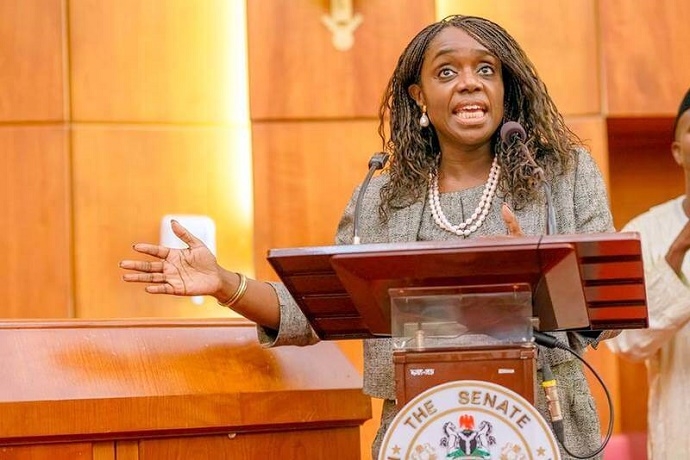 Mrs. Kemi Adeosun, Minister of Finance[/caption]
Mrs. Kemi Adeosun, Minister of Finance[/caption]
In a bid to lower debt servicing costs for the government, which plans to increase local borrowing to boost the economy, the Minister of Finance, Kemi Adeosun has urged the central bank of Nigeria for benchmark interest rates reduction.
Adeosun disclosed this at a meeting of business leaders in Abuja yesterday.
Speaking with CNBC Africa yesterday, the minister said she wanted the CBN to reconsider its decision at the July Monetary Policy Committee (MPC) meeting which saw a hike in benchmark interest rate from 12 per cent to 14 per cent.
Advertisement
She also disclosed that the Securities and Exchange Commission and the Pension Commission had approved plans to enable the investment of as much as $20 billion of pension fund in the development of the country’s infrastructure.
She said, “A new instrument that will allow pension funds to invest in infrastructure bonds; that’s what will drive, for example, our social housing and our roads programme outside the budget.”
The Monetary Policy Committee of the CBN commenced its meeting in Abuja yesterday and would hold a press briefing at the end of the meeting today, to announce its decisions.
Analysts are optimistic that the MPC would hold rates as a hike in rates would further put more pressure on the ailing economy and a cut will send negative signal to investors.
Advertisement
Adeosun said the Finance Ministry was working with the Debt Management Office, Nigeria’s sovereign wealth fund and the pension industry to issue an infrastructure bond to raise money for road and housing projects, although she did not elaborate.
“We need lower interest rates because when we are borrowing and interest rates go up, it increases our cost of debt service and it reduces the amount of money that is available to spend on capital projects.
“The attempt was to manage inflation and the trade-off for the economy right now is, what is a bigger problem: Is it growth or inflation? For me it is growth. I would rather seek growth. We can manage inflation. I think for us, at the moment in the Nigerian economy, growth is the most important thing,” Adeosun told CNBC.”
The CBN governor, Godwin Emefiele, had at the last MPC meeting, said the hawkish stance was to help support the naira and attract foreign investment inflows.
The value of the naira has risen from N197 to the dollar to around N325 since the apex bank allowed market forces to determine its value. At the black market, the currency sells at N425 to the greenback amidst foreign currency shortages at both ends of the market.
Advertisement
The minister further told CNBC that the government was working with parliament to cut procurement timelines to get contractors back to work and inject money into the economy. The government had earlier said it planned to set up a $25 billion infrastructure fund to invest in the transport and energy sectors.
Adeosun said some adjustment was needed to narrow the spread between the official and black market currency rates, which is running at 25 percent after the central bank floated the naira.
“We still need to make some necessary adjustments to ensure that the spread is narrow so that we have true price discovery,” she said.
Recall that the minister had last week announced the planned injection of N350 billion into the economy to pull it out of recession.


